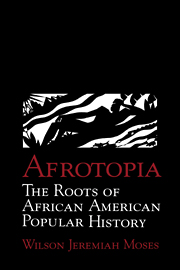Book contents
- Frontmatter
- Contents
- Acknowledgments
- Dedication
- 1 Introduction
- 2 Varieties of Black Historicism
- 3 From Superman to Man
- 4 Progress, Providence, and Civilizationism
- 5 W. E. B. Du Bois and Antimodernism
- 6 Afrocentrism, Cosmopolitanism, and Cultural Literacy in the American Negro Academy
- 7 Caliban's Utopia
- 8 Barbarism Grafted onto Decadence
- 9 Conclusion
- Notes
- Index
8 - Barbarism Grafted onto Decadence
Published online by Cambridge University Press: 10 November 2009
- Frontmatter
- Contents
- Acknowledgments
- Dedication
- 1 Introduction
- 2 Varieties of Black Historicism
- 3 From Superman to Man
- 4 Progress, Providence, and Civilizationism
- 5 W. E. B. Du Bois and Antimodernism
- 6 Afrocentrism, Cosmopolitanism, and Cultural Literacy in the American Negro Academy
- 7 Caliban's Utopia
- 8 Barbarism Grafted onto Decadence
- 9 Conclusion
- Notes
- Index
Summary
It is ironic that around the time Domingo mockingly described Garvey as a Caliban, the metaphorical imputation of savagery was being transformed from a curse into a badge of honor and radical authenticity among African and African American intellectuals. Many were beginning to portray themselves as antimodernists or anticivilizationists. Gwendolyn Bennett in “Heritage,” Countee Cullen in his poem of the same name, and Langston Hughes, in “Nude Young Dancer,” sentimentalized the primitivism of the West African forest, and all proclaimed their exasperation with bourgeois civilization. Bennett wrote the following:
I want to hear the chanting
Around a heathen fire
Of a strange black race.
The poetry of such authors manipulated and transformed traditional racial stereotypes. In this it resembled the devices of Vachel Lindsay in his poem “The Congo: A Study of the Negro Race” (1914), which depicted the Africans “basic savagery,” “their irrepressible high spirits,” the “hope of their religion.” The work alternated scenes of African American life with flashes of jungle savagery, “tatooed canibals,” and “skull-faced with doctors.”
Boomlay, boomlay, boomlay, Boom
A roaring, epic rag-time tune
From the mouth of the Congo
To the Mountains of the Moon.
There were critics who applauded the primitivist theme when produced by black poets, but balked at its presentation by Lindsay, who was white. Lindsay's racial romanticism did, indeed, employ racialist stereotypes, but it also attributed strength and vigor to the African personality, and lamented the process whereby it became “civilized.”
- Type
- Chapter
- Information
- AfrotopiaThe Roots of African American Popular History, pp. 210 - 225Publisher: Cambridge University PressPrint publication year: 1998



